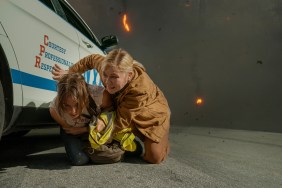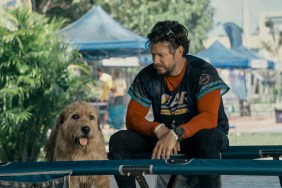
As a lifelong fan of N.W.A., I walked into Straight Outta Compton expecting something of a sanitized story of the gangsta rap group comprised of ’80s West Coast rap pioneers Ice Cube, Dr. Dre, Eazy-E, MC Ren and DJ Yella. One fear had to do with the fact Cube and Dre were producing the film while Eazy, the troubled group’s frontman, passed away in 1995. Ren and Yella are onboard as “N.W.A. advisors” and Cube’s son, O’Shea Jackson Jr., actually stars as his father in the movie. Given the circumstances it was hard to expect an entirely unbiased look at the lives these guys led, growing up in Compton, Calif. exploring the struggles they faced, the mistakes they made, the success they found, the discrimination, the infighting, the breakups, etc. Taking that into consideration, things are as they would be expected, the end result is a mixed bag.
Socially, the film is sure to make an impact as one particularly hard scene to watch leads to the birth of the notorious song “Fuck tha Police” after several instances of police brutality and mistreatment play heavy on the lives of the young men growing up and even once they hit it big. It’s only obvious the environment within which they found themselves in would serve as an influence for their music. Of course, it’s really only this police angle we get much of a glimpse into. There’s some exploration of their womanizing merely in terms of their time on the road surrounded by naked groupies and a sequence that takes place at Eazy’s “Wet and Wild Party”, but we don’t get much of a look into any reasoning for their violent lyrics toward women or their violent lyrics in general.
Certainly some of this comes based solely on their life experience and what they witnessed around them. The scene where Eazy first records “Boyz n tha Hood” is comically effective as Cube has to explain to Eazy what a ’64 is despite the fact no one in the group owns one, making it quite clear these raps aren’t always coming straight from the heart. Digging into whether or not a lot of these lyrics were used merely because they sounded good rather than coming from explicit moments in their lives would have been just as interesting, if not more interesting, creating far more textured characters with plenty of room for shades of grey.
Playing the film’s leads are the aforementioned O’Shea Jackson Jr. whom you won’t need any convincing is Cube’s son as he has his mannerisms and movements mastered, all the way down to Cube’s signature lip curl. Corey Hawkins is the Juliard trained actor taking on the role of Dr. Dre, a role that has some of the film’s heaviest lifting with Hawkins asked to tap into some real emotion to mixed results following the death of Dre’s young brother not to mention his battles with Suge Knight (R. Marcos Taylor), a character that looms large as you don’t even need to follow rap to know the name or his infamy.
Neil Brown Jr. as Yella and Aldis Hodge as Ren get limited time on screen, while Jason Mitchell as Eazy is something of a driving force throughout the film, thanks to his personality, sense of humor, his character’s plight and most specifically his relationship with music manager Jerry Heller (Paul Giamatti). The relationship between Eazy and Heller proved damaging to the group, with Eazy treated to steak and lobster while the others ate Fatburger. The way Heller is portrayed, however, is curious.
Heller is clearly a supporter of the group, though his tactics seem a shade off. Straight Outta Compton never dwells too long and hard on finances and only touches on contracts and bad deals with a blurry lens so it’s never quite clear how Heller screwed the group over, all that’s implied is he did, playing the fellas against one another. I guess I find that hard to believe considering Dre had the beats and Cube had the rhymes, why push any of them away?
All this considered, don’t go looking for some kind of by-the-book telling of this story. Instead, anyone walking in as a fan with the slightest bit of familiarity is going to not only love the music, but you’ll revel in moments such as Tupac (Marcc Rose) hearing “California Love” for the first time and Dre laying down the beat for “Nuthin’ but a G Thang” while Snoop (Keith Stanfield) freestyles over top of it. Hell, just that moment a cassette tape is shown with the words “Bone” on it was enough for me as you begin to realize how massive the effect N.W.A. had not only on the music scene, but the world of entertainment at large as Ice Cube is now a bonafide, bankable movie star and Dre sold Beats to Apple for $3 billion.
Director F. Gary Gray (Friday, The Italian Job) is workmanlike with his vision. Powerful social imagery and energetic live performances are matched with a sense of bravado. I just wish the film didn’t feel so much like a vanity project, though at the same time I couldn’t help think while watching how excellent a dramatic television series would be if they were able to get the rights to all of the music. From Ruthless to Death Row to Aftermath and everything in-between and what followed, the story told within the walls of this nearly two-and-a-half-hour film is too big to be contained by one film.
For this reason I can understand why Gray and screenwriters Jonathan Herman and Andrea Berloff skirted the groups controversial edges and used the police and business angle to tell the story, even if it does seem a little soft for a movie about a group that was decidedly hard.
SIDE NOTE: The scene where Cube’s “No Vaseline” plays is one of the best scenes of the year. The song, the reactions, Ren’s line once the music ends… Perfect!









